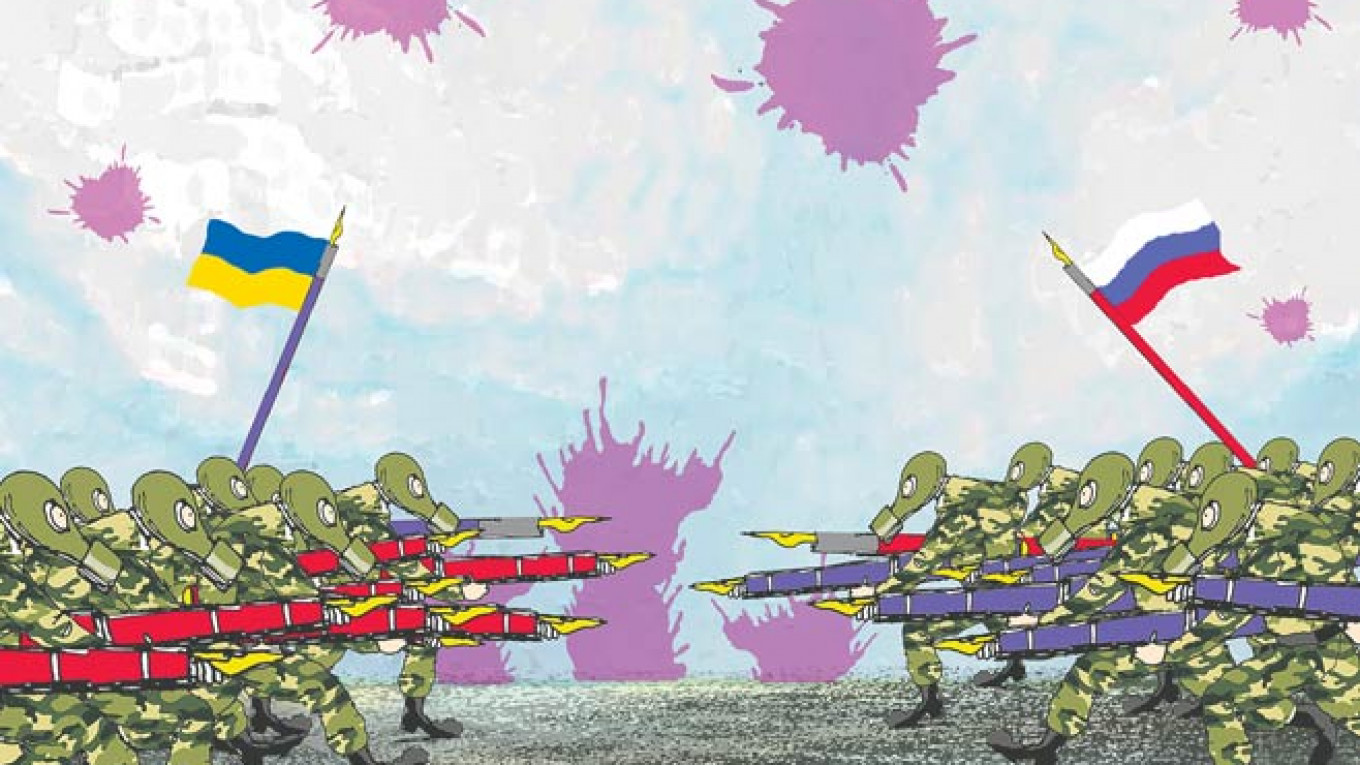A couple of days ago in Washington, a former high-level U.S. government official mentioned to me that if a civil war breaks out in Ukraine, it would follow not the Bosnian scenario, but the Spanish one. Just as in the case of Spain in the mid-1930s, the civil conflict in Ukraine could rapidly escalate and internationalize, with major external powers getting actively involved and chances for a compromise becoming more elusive.
If a civil war breaks out in Ukraine, it will not likely follow the Bosnian scenario, but the Spanish one from the mid-1930s.
There is some logic in this historical parallel. Recent developments indicate a growing danger of further escalation of the conflict in Ukraine. The authorities in Kiev are hastily setting up their National Guard, while their opponents in the east and in the south are mobilizing volunteers to form their own militia. The first clashes have already resulted in casualties on both sides. A large amount of small arms have disappeared from warehouses and might have wound up in private hands, meaning any spark may very well ignite a large-scale conflict.
On the borders of Ukraine, we are seeing an unprecedented military buildup. Russia has been conducting large-scale military exercises in the adjacent region that have already caused serious concerns in the West. At the same time, NATO has returned to the old rhetoric about the "threat from the East" and has decided to increase its military presence in parts of Europe. The U.S. is now planning to deploy an army brigade in Poland and to strengthen its air force presence in the Baltic region. There are ongoing NATO naval exercises in the Black Sea, and the president of the Czech Republic has called for a NATO military presence in Ukraine itself. High-level representatives of Western intelligence agencies have become frequent visitors to Kiev, creating yet another irritant for Moscow.
Meanwhile, the propaganda war is becoming more intensive. All sides in the conflict present only their own version of developments in Ukraine, and there are an increasing number of restrictions on journalists and on television channels operating in Ukraine. In Germany, there are even calls for removing a monument dedicated to the Soviet victory in World War II.
Russia, for its part, is reaching out to the European far-right; Marie Le Pen, president of the French National Front, received a warm reception in Moscow. The United Nations takes an ambiguous position on the Ukrainian situation, and European security organizations cannot decide what to do under the current circumstances.
These developments do not seem very reassuring. But the world of the 21st century is very different from Europe of the 1930s. Unlike 80 years ago, major players do not have irreconcilable clashes of fundamental interests. On the contrary, all of them are united in their needs to combat new security threats, such as international terrorism, cyber warfare and political extremism. The abilities of key actors to overcome their specific disagreements on the causes, developments and preferred outcomes of a major European crisis to agree on a common action plan should be much higher today than they were in 1930s. The plan can only be based on the commitment to avoid confrontation and to consolidate efforts to assist Ukraine in restoring its statehood and advancing badly needed economic and political reforms.
It seems obvious that the international communication about the Ukrainian crisis should not be limited to telephone calls between Moscow, Washington and select European capitals. Common actions on the ground are the cornerstone for any realistic plan to rescue Ukraine. We need to put together a high-level contact group, which could work on a permanent basis together with appropriate Ukrainian authorities on urgent tasks of stabilizing the security, political, social and economic situation in the country — that is, on blocking any further escalation of the crisis. The participants at Thursday's Geneva meeting — the European Union, Russia, the U.S. and Ukraine — should constitute the core of the contact group. But even that is not enough. The group should also include high-level representatives of European countries that signed the compromise agreement of Feb. 21 with then-Ukrainian President Viktor Yanukovych.
The Ukrainian crisis has no easy or swift solutions. We should be ready for a long journey with a lot of bumps on the road. There will undoubtedly be disagreements, frustrations and setbacks. But if we do it right, the crisis in Ukraine will wind up in future history books not as an analogy of the Spanish Civil War, but rather as a model for dealing with numerous crises and conflicts in other parts of the world, as an example of the new, 21st-century global governance.
Igor Ivanov, Russia's foreign minister from 1998 to 2004, is the president of the Russian International Affairs Council.
A Message from The Moscow Times:
Dear readers,
We are facing unprecedented challenges. Russia's Prosecutor General's Office has designated The Moscow Times as an "undesirable" organization, criminalizing our work and putting our staff at risk of prosecution. This follows our earlier unjust labeling as a "foreign agent."
These actions are direct attempts to silence independent journalism in Russia. The authorities claim our work "discredits the decisions of the Russian leadership." We see things differently: we strive to provide accurate, unbiased reporting on Russia.
We, the journalists of The Moscow Times, refuse to be silenced. But to continue our work, we need your help.
Your support, no matter how small, makes a world of difference. If you can, please support us monthly starting from just $2. It's quick to set up, and every contribution makes a significant impact.
By supporting The Moscow Times, you're defending open, independent journalism in the face of repression. Thank you for standing with us.
Remind me later.








